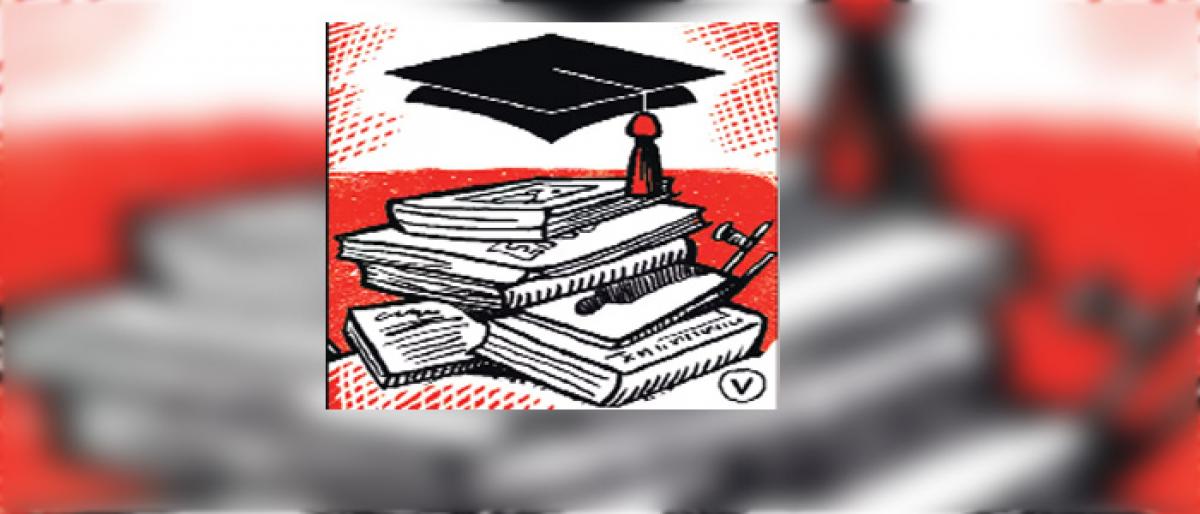Live
- DEO suspends teacher accused of sexual assault
- PM ‘cursing’ Congress out of despair: Maharashtra Cong Chief
- Applications are invited for Junior Colleges Scheme District Scheduled Castes Development Officer Ramlal
- A nomination was filed on the second day for the Nagar Kurnool parliamentary seat
- SP Gaikwad inspected the Telangana Amarnath Saleswaram Jatara yatra arrangements
- Rahul Gandhi's decision to contest from Wayanad shows 'lack of confidence': BJP President Nadda
- IPL 2024: Delhi bowlers will go after all of SRH’s top-order batters, says head coach Ricky Ponting
- At Amroha rally, PM Modi sends out ‘meaningful’ message for Muslims and Hindus
- Tripura records highest 79.83 pc voter turnout in Northeast
- The government has to clear the confusion
Just In

Questions are being raised over the process of granting accreditation to several conventional and professional private colleges in the State by the University Grants Commission (UGC) and National Board of Accreditation (NBA)
Hyderabad: Questions are being raised over the process of granting accreditation to several conventional and professional private colleges in the State by the University Grants Commission (UGC) and National Board of Accreditation (NBA).
According to sources, except a few, most of the accredited colleges by both the statutory bodies are not in a position to either fulfill or maintain the conditions under which they had been accredited and the situation of technical institutions is said to be turning from bad to worse.
It may be mentioned here that the National Assessment and Accreditation Council (NAAC) was established by the UGC in 1994. Following the introduction of the UGC (Mandatory Assessment and Accreditation of Higher Education Institutions) Regulations, 2012, it has become a priority for educational institutions to undergo NBA accreditation.
The NAAC issues accreditation certification for a period of five years to higher education institutions other than technical institutions.
Similarly, the NBA was established under the All India Council of Technical Education (AICTE) in 1994. But, it has become an autonomous body since 2010 to certify assurance of quality, the relevance of education in professional and technical disciplines of Engineering and Technology, Management, Architecture, Pharmacy, and Hospitality.
Speaking to The Hans India, a senior official from the Telangana State Council for Higher Education (TSCHE) said, “In case of conventional courses, the fall of standards is not felt immediately. However, in case of technical institutions, the effects would be visible in a short span of time,” he added.
For example, most of the companies from information technology, pharmacy and the like which had made Hyderabad as their home for over the last two decades look for accredited institutions for recruitment of quality human resources. If they did not get it from the State, then they would be forced to bring people from different parts of the country, he pointed out.
Taking a similar line, Vice-Chancellor of a prominent university in the State said, “If we go by the rule book, asking the technical institutions affiliated to us, then, not more than 10 to 15 per cent of them qualify to run the colleges,” he said, adding that taking punitive actions would not be easy as it would hit the students hard. “So, we have adopted bringing improved compliance with rules year after year to improve the conditions to ensure that the standards are maintained,” he said.
Given the current scenario, some of the institutions are not in a position to fulfill even minimum conditions like hoisting websites to provide accurate information to the students. Nearly 44 technical institutions affiliated to Jawaharlal Nehru Technological University (JNTU-H) were found not maintaining the websites. That apart, shortage of doctorates as prescribed by both the accreditation bodies for teaching postgraduate courses remained a problem in case of colleges running sciences and engineering courses.
Senior officials from the TSCHE pointed out that the universities concerned had been verifying the facts following complaints that there were no doctorate holders in about 150 colleges affiliated to different institutions, including JNTU-H. Similarly, claims of valid doctorate certificates are yet to be verified in case of about 160 colleges, in which some are even accredited institutions.
On top of it, what is more worrying is that the growing trend of appointing teachers who have the basic degree in Electrical, Electronics, Mechanical and Civil Engineering pursuing Ph D in computer sciences. And, most of these degrees were obtained from universities whose credibility was in question, the sources said.
However, the colleges could manage to get the accreditations from both the statutory bodies despite these glaring shortcomings remains a puzzle, the sources pointed out.

© 2024 Hyderabad Media House Limited/The Hans India. All rights reserved. Powered by hocalwire.com







